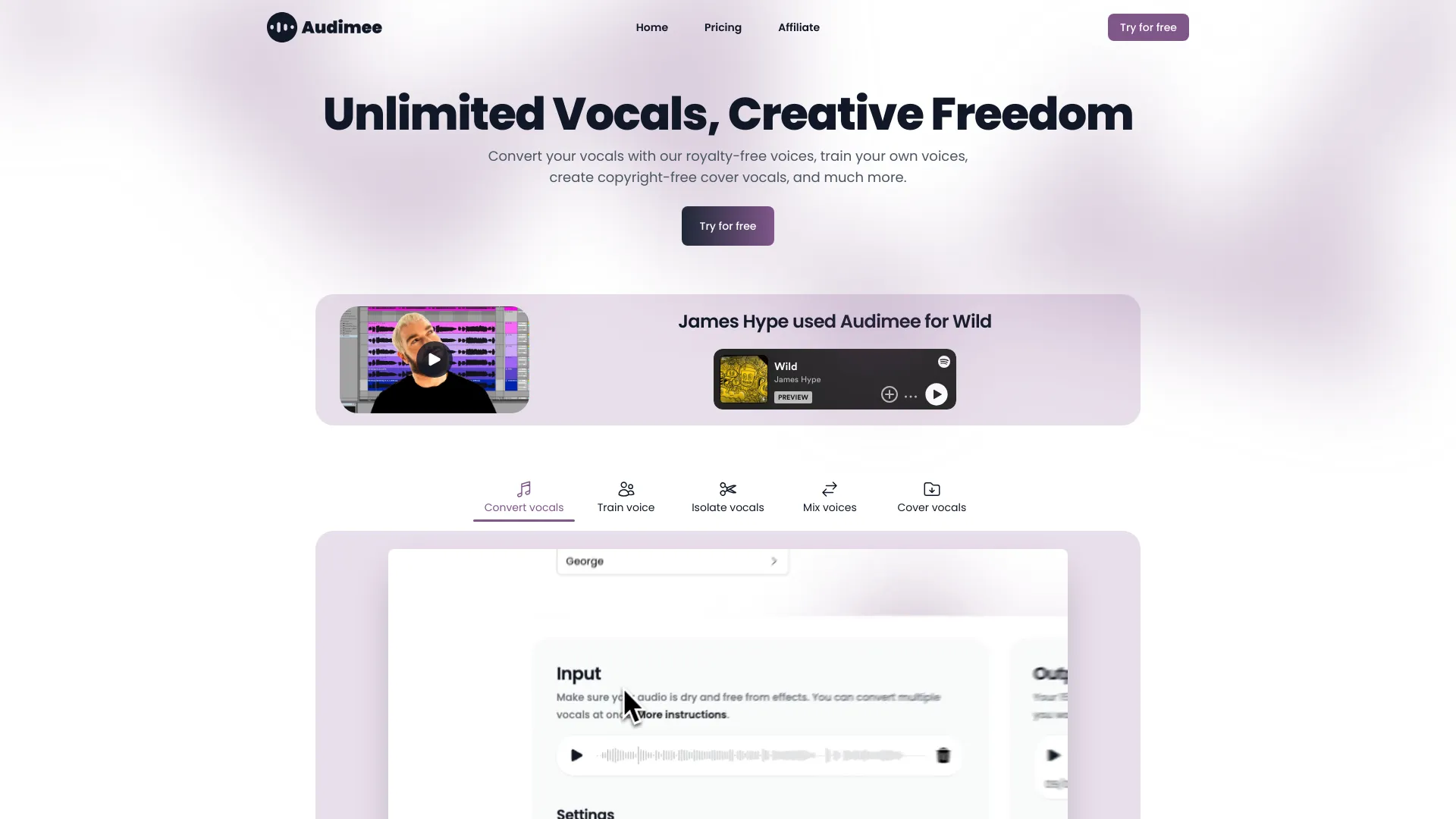- Home
- AI Singing Generator
- Audimee

Audimee
Open Website-
Tool Introduction:AI avatars, voiceovers, templates—create studio-quality videos fast.
-
Inclusion Date:Oct 21, 2025
-
Social Media & Email:
Tool Information
What is Audimee AI
Audimee AI is a voice-to-voice audio tool that transforms any vocal using studio-quality models. It enables creators to convert vocals with royalty-free voices, train a custom voice from their own recordings, and generate copyright-free cover vocals. Beyond vocal conversion, Audimee supports vocal isolation, harmony creation, and voice mixing—helping users separate stems, shape tone, and stack harmonies without complex plugins. Built for music producers, podcasters, and video creators, it streamlines modern AI audio workflows with consistent, polished results.
Audimee AI Main Features
- Vocal Conversion: Transfer timbre while preserving timing and pitch to re-voice performances with studio-grade models.
- Royalty-Free Voices: Choose from prebuilt voices cleared for creative use, helping avoid licensing hassles.
- Custom Voice Training: Train a voice model from your recordings to achieve a consistent, personal vocal identity.
- Copyright-Free Cover Vocals: Create cover-style vocals designed to be used without copyright complications.
- Vocal Isolation (Stem Separation): Extract clean vocal stems from mixed tracks for remixing, editing, or post-production.
- Harmony Creation: Generate stacked harmonies and doubles to enrich arrangements and choruses.
- Voice Mixing: Balance levels and blend multiple vocal layers for a cohesive mix-ready sound.
- Flexible Export: Output isolated stems or full mixes for easy use in any DAW or video editor.
- Creator-Friendly Workflow: Simplifies complex vocal tasks so you can focus on arrangement, performance, and storytelling.
Who Is Audimee AI For
Audimee AI suits music producers, indie artists, vocalists, and cover creators who need fast, reliable AI vocal conversion. It also benefits podcasters and video creators seeking clean vocal isolation, brand-consistent voices, or harmony layers without booking studio time. Sound designers, educators, and social media creators can use it to prototype ideas, repurpose performances, and deliver polished audio at scale.
How to Use Audimee AI
- Import audio: upload a vocal track or record directly.
- Select a model: choose a royalty-free voice or your trained voice model.
- Set conversion options: adjust pitch, formant, and intensity to match your target sound.
- Process the track: run vocal conversion or vocal isolation as needed.
- Create layers: add harmonies, doubles, or alternate takes and use voice mixing to balance.
- Review and export: preview results, refine settings, then export stems or a final mix for your DAW.
Audimee AI Industry Use Cases
In music production, an indie artist can re-voice a demo with a royalty-free voice, isolate original vocals for sampling, and stack harmonies for a fuller chorus. For podcasting, editors can separate speech from background tracks, standardize tone using a trained voice, and mix intros/outros quickly. Video creators can generate consistent narration, convert vocal takes to fit different characters, and deliver copyright-safe cover vocals for promotional content.
Audimee AI Pros and Cons
Pros:
- Studio-quality voice-to-voice conversion with consistent results.
- Royalty-free voices and copyright-free cover vocals to simplify licensing.
- Custom voice training for brand-consistent narration or artist identity.
- Built-in vocal isolation, harmony creation, and voice mixing in one workflow.
- Exports stems for seamless use in DAWs and video editors.
Cons:
- Quality depends on input recordings; noisy or heavily processed vocals may yield artifacts.
- Custom voice training may require sufficient, clean data and time.
- Legal and ethical considerations vary by region and use case; rights clearance may still be needed for underlying compositions.
- Less granular control than advanced, plugin-heavy DAW chains.
Audimee AI FAQs
-
Is it legal to use converted vocals commercially?
Audimee provides royalty-free voices and copyright-free cover vocals, but you should review license terms and ensure rights for any underlying composition or samples in your project.
-
What audio works best for vocal conversion?
Clean, dry vocals with minimal effects and low background noise typically produce the most natural results.
-
Can I train my own voice model?
Yes. Provide sufficient, high-quality recordings of your voice to build a consistent custom model for narration or singing.
-
Does it integrate with my DAW?
You can export isolated stems or converted vocals and import them into any major DAW or video editor for further mixing.
-
What is the difference between vocal conversion and vocal isolation?
Vocal conversion changes the timbre of a performance into a target voice, while vocal isolation separates the vocal from a mixed track into clean stems.


